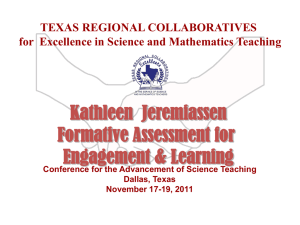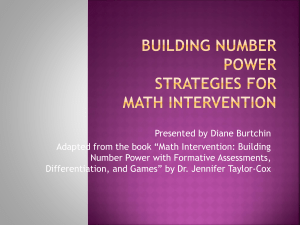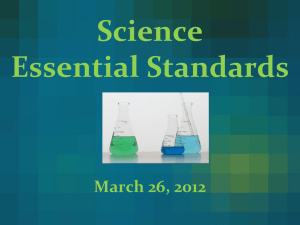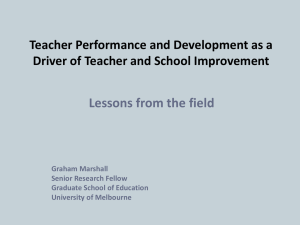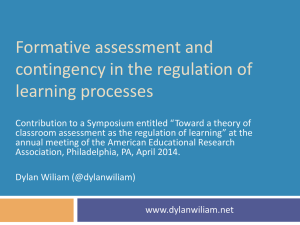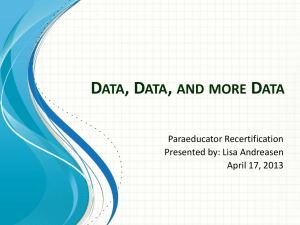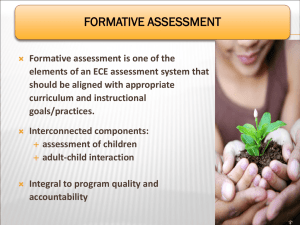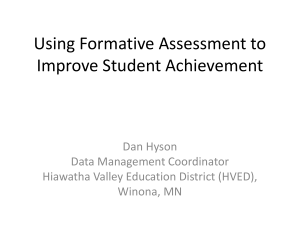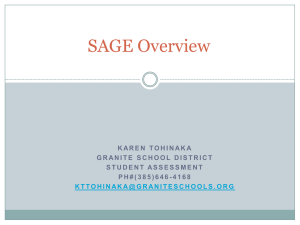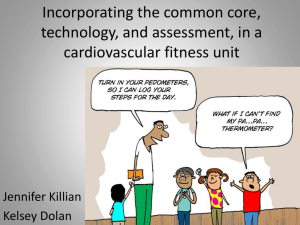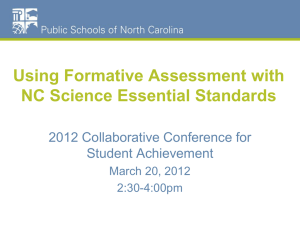File - Integrated Middle School Science Partnership.
advertisement
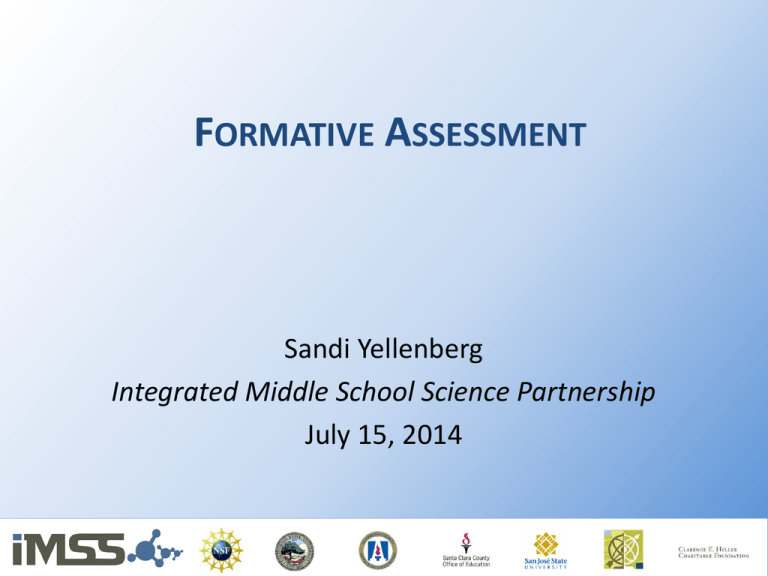
FORMATIVE ASSESSMENT Sandi Yellenberg Integrated Middle School Science Partnership July 15, 2014 What type of misconception does this represent? For Additional Information About Misconceptions Making Sense of Secondary Science Research into Children’s Ideas By Driver, Squires, Rushworth & Wood-Robinson NSDL (National Science Digital Library) Strand Maps http://strandmaps.nsdl.org/ 3 Types of Assessments 1. Diagnostic: Identifies and analyzes what students already know and their line of reasoning – their current understanding as well as their misconceptions 2. Formative: Provides teachers and students with feedback about student learning without concerns about grading. It’s only formative if it is used to inform instruction. 3. Summative: Measures and documents how well students have achieved a learning target. *NOTE: Diagnostic becomes formative when the assessment data is used to inform instruction. Ideas about Formative Assessment “Ideas about assessments have undergone important changes in recent years. In the new view, assessment and learning are two sides of the same coin. . . . When students engage in assessments, they should learn from those assessments.” National Research Council, National Science Education Standards. (Washington, DC: National Academy Press, 1996), pp. 5–6. Say Something - Reading Strategy Rules for Say Something: 1. In group of 2-4, decide who will say something first. When you say something, do one or more of the following: • Make a prediction. • Ask a question. • Clarify something you had misunderstood. • Make a comment. • Make a connection. 2. If you can't do one of these five things, you need to reread the material you are responding to. Source: When Kids Can't Read: What Teachers Can Do. Kylene Beers, 2003. Feedback is Critical to Success Formative Assessment Feedback is most successful when: • It responds to clear and specific learning goals • Students are committed to attaining the learning goals • It provides effective cues for accomplishing the task • It relates to students’ prior knowledge Based on the work of Hattie and Timperley (2007) Effective Feedback is: • Task or Product Feedback: give a substantive cue to accomplish task • Process Feedback: cue prior knowledge to help accomplish task • Self-regulated Feedback: prompts the use of metacognition [Encouraging words like, “Good job, Try Harder” are generally ineffective .] Based on the work of Hattie and Timperley (2007) What is your experience with Formative Assessment Probes? What is your experience with Formative Assessment Probes? Camping Trip from: Uncovering Student Ideas in Science Volume (4 page 137) Five friends were camping in the north woods. It was a clear night with mild weather conditions. Sunset was a 9:14 p.m. Sunrise was at 5:22 a.m. The five friends wondered when it would be coldest as they slept under the stars. This is what they said: Colin: “I think it will be coldest right after the Sun sets.” Bono: “I think it will be coldest at midnight’” Jeri: “I think it will be coldest around 3:00 a.m. Emma: “I think it will be coldest at the beginning of sunrise.. Kit: “I think it will be coldest a few hours after sunrise. Which person do you agree most with and why? Explain your answer. Looking for Evidence of Understanding In your explanation, did the you include: CLAIM – Statement that answers any questions on a topic. EVIDENCE – Data or information that support the claim. REASONING – Justification that connects the evidence to the claim, using a scientific principle when appropriate, or showing how other data do not support the claim What are Page Keeley Formative Assessment Probes? • Questions that link a key idea to a researchidentified misconception. • A probe reveals more than just an answer. A probe elicits a response that helps teachers understand students’ thinking and the ideas that may impede their learning. • Probes also engage learners, promote metacognition, and encourage evidence-based explanations and argumentation. What Probes Can Accomplish: • • • • • • • • • • Elicit and Identify Preconceptions Engage and Motivate Students Activate Thinking and Promote Metacognition Provide Stimuli for Scientific Discussion Initiate Scientific Inquiry and Idea Exploration Formal Concept Development & Transfer Improve Questioning and Quality of Student Responses Provide Teacher to Student Feedback Peer and Self-Assessment Provide opportunities for student reflection Students’ need to know their ideas are important, regardless of whether they are right or wrong. Create a classroom environment where students feel safe to share their thinking. Formative Assessments, like Probes can help accomplish this type of classroom environment. What types of Probe? Preconception form Every Day Experience Ideas students bring to the classroom from their every day interactions with the natural world. These idea make sense to them, based on their experiences. What types of Probe? “Learned” Conceptual Misunderstandings Content students learn in school that may be misinterpreted by the students and often goes unnoticed by the teacher. Students make their own meaning out of what is taught. What types of Probe? Intuitive Rules “Common sense rule” applied in a variety of contexts that are based on intuition or logic that works with a different phenomenon. More A, means More B Closer – Hotter Opposites Additive Reasoning Types of Probes Partial Conception Student has some scientific knowledge but has difficulty connecting concepts, generalizing, or confuses one concept with another. Types of Probes Generalization (over or under) Using a rule or concept that applies only to certain examples or not applying a general rule or concept across all examples. Types of Probes Vernacular Misconceptions Based on the way we use words or phrases in our everyday language that have a different meaning if science. Thank You • For more information, please visit http://www.sciencepartnership.org/ • Contact sandra_yellenberg@sccoe.org with any questions or concerns. • Materials will be available _______

